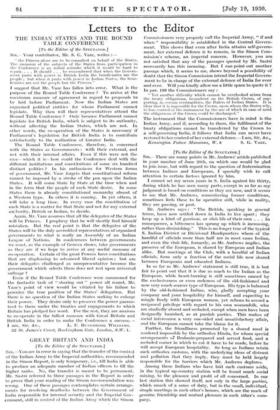Letters to the Editor
THE INDIAN STATES AND THE ROUND TABLE CONFERENCE [To the Editor of the SPECTATOR.] Sin,—Your contributor, Mr. S. G. Vaze, writes ;— " the Princes alone are to be consulted on behalf of the States. The omission of the subjects of the States from participation in the Conference is an initial mistake which it would be hard to repair. . . . It should . . . be remembered that when the Govern- ment parts with power in British India the beneficiaries are the people ; but when it parts with power in Indian States, the bens. ficiaries are not the people but the Princes."
I suggest that Mr. Vaze has fallen into error. What is the purpose of the Round Table Conference ? To arrive at the maximum measure of agreement in regard to proposals to be laid before Parliament. Now the Indian States are organized political entities for whom Parliament cannot legislate. Why then will their representatives attend the Round Table Conference ? Only because Parliament cannot legislate for British India, which is subject to its authority, without affecting the Indian States, which are not. In other words, the co-operation of the States is necessary if Parliament's legislation for British India is to contribute satisfactorily to the realization of Greater India.
The Round Table Conference, therefore, is concerned with the States as Governments : with their external, and not with their internal affairs. Even if this were not the case—which it is—how could the Conference deal with the different institutions and constitutions of some six hundred distinct polities ? In his enthusiasm for Western forms
of government, Mr. Vaze forgets that constitutional reform
cannot be imposed by a stroke of the pen upon the Indian attention to certain factors ignored by him.
States. It will come State by State at the time when and will sometimes feels these to be operative still, while in reality, each State is a matter for that State and not for any external they are passing, or past.
authority, British or Indian, to decide. Mr. Andrews says : " The British, speaking in general Again, Mr. Vaze assumes that all the delegates of the States terms, have now settled down in India to live apart ; they k
will be Princes. I prophesy that he will shortly find himself keep up a kind of garrison, or club life of their own . . . In consequence, a bitterness has sprung up which is increasing, mistaken. But the real point is that the delegates of the rather than diminishing." This is no longer true of the typical States will be the duly accredited representatives of organized
governments to what is really an Assembly of an Indian S. Indian District or Divisional Headquarters where of the League of Nations. In conferences between governments handful of officials more than half are in most cases Indian, we must, as the example of Geneva shows, take governments and even the club life, formerly, as Mr. Andrews implies, the as they are if we hope to arrive at any useful measure of preserve of the European, is shared by European and Indian co-operation. Certain of the great Powers have constitutions alike. But meetings at the Club, with a handful of Indian
officials, form only a fraction of the social life now shared that are displeasing to advanced liberal opinion ; but arc their delegates challenged as unrepresentative because the between Europeans and educated Indians. In so far as Mr. Andrews' statement is still true, it is but government which selects them does not rest upon universal
fair to point out that it is due as much to the Indian as the suffrage ?
the exclusiveness or even rudeness of the old-fashioned and the fantastic task of " sharing out " power all round, Mr. now very much scarcer type of European. His type is balanced Vaze's point of view would be vitiated by his failure to perceive the true position of the States' delegation. But by the old-fashioned Indian, who, gladly accepting your there is no question of the Indian States seeking to enlarge company and your hospitality for himself, and expecting to their power. They desire only to preserve the power guaran-
mingle freely with European women, yet refuses to accord a teed to them under the treaties and engagements to which reciprocal privilege with regard to his own womenfolk, who a Britain has pledged her word. For the rest, they are anxious are studiedly absent and secluded, except when men have been designedly banished, as at purdah parties. This makes of to co-operate in the fullest measure with Great Britain and rt British India in order to make the Conference a success.-- social intercourse a very one-sided and unsatisfactory affair, 82 Si. James's Court, Buckingham Gate, London, S. W.1.
















































 Previous page
Previous page